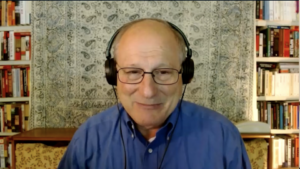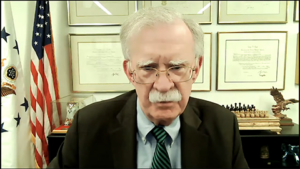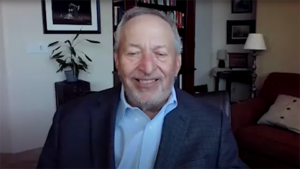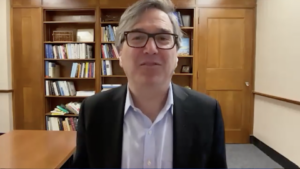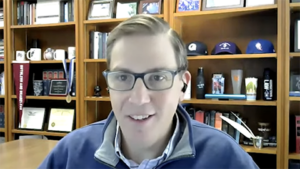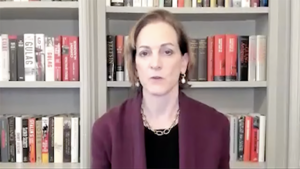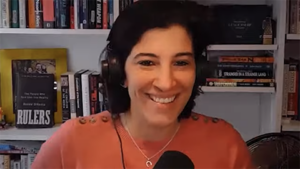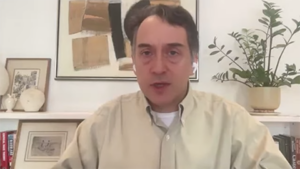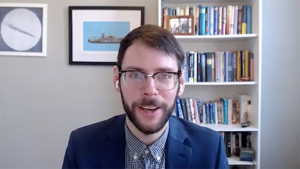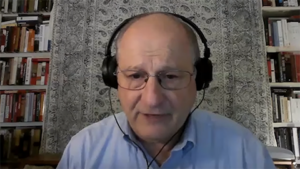Where do things stand five months after Election Day?
According to veteran reporter and commentator A.B. Stoddard, Trump’s second term has been far more radical than many anticipated. As she puts it: “The more power you give [Trump], the more he’ll take. And the less pushback that he gets, the freer he is. So I think what we’ve seen in the last couple of months is that he’s been given permission and he will take it. That’s the way Trump is…. So people need to not underestimate the fact that things could be much, much worse in three months or a year.” In a wide-ranging assessment of the state of our politics, Stoddard shares her perspective on the Trump agenda, the Republican Party’s acquiescence, and the situation of the Democratic Party opposing Trump. Stoddard and Kristol also consider how opponents of Trump might chart alternative paths forward in the months and years ahead.
STODDARD: [Even those] predicting doom were definitely only caught off guard by the Elon factor. We knew that loyalists would come in or replace people of expertise and integrity and ethics, and it would be filled with people who were nihilists and inexperienced and just only loyal to Trump, ready to trample parts of the government without a second thought in service to his whims. Also—I tried to make this clear as much as I could in 2024, whether in things I wrote or in speeches I gave—pre-pardoned so that they could carry out any illegal or unconstitutional order. So very, very dangerous who he would bring in the second time, learning from the mistakes of the resistance he faced internally in the first term. Then those nominees, I think he thought that he wouldn’t get them all through. It’s kind of a wild card. You go in negotiations, you go crazy with your first offer expecting to lose it, and that gets you leeway in your second choice. So that’s really not what happened. Republicans folded. It empowered Trump. But now that I’ve listened to Anne Applebaum who had recently described Viktor Orbán’s breaking down of all of the different components of Hungary that would help him concentrate and centralize power, you see that it is textbook. The speed surprised me. I knew he would do all these things, but it really helps once he got those nominees in place, and that was a real victory, to see the Republicans fold that quickly. Watching him go after universities, the free press, everything at once. Stepping back a bit, I see that it is part of an intentional formula: that if you desensitize, if you destabilize the populace that rapidly, and you produce that much chaos, you’re desensitizing them that much faster to do whatever you want as quickly as you want.
STODDARD: I do find among my friends and peers and family, people who are not following this closely, they believe that there’s this hundred-day sprint and then it will end. I think that they believe there’s some guardrails that are going to magically appear like airbags in a car accident. And Susie Wiles, the chief of staff, will have a conversation with a very high-ranking person at the CIA, and all this nonsense will be stopped. That’s not what happens. It accelerates and it grows because the more power you give him, the more he’ll take. And the less pushback back that he gets, the freer he is. And so I think what we’ve seen in the last couple of months is that he’s been given permission and he will take it. That’s the way Trump is. And he believes—his pathologies create a story for him—that this is what the people want, that they adore everything he does. And so when he doesn’t have to take a lot of phone calls from senators over tariffs or crapping on Volodymyr Zelensky in the Oval Office, he feels that that’s permission for more destruction. So he’s not acting like a man who’s worried about reelection. When he talks about a third term, he says that people are demanding it because everything he’s doing is so popular. So I think people need to not underestimate the fact that things could be much, much worse in three months or a year.
STODDARD: This talk of the third term and whether or not your vote is going to count, I think alongside kitchen table issues is absolutely essential to try to educate the public on what’s coming. That Trump in the end intends to control the rule of law, the courts, everything, but he wants to control elections and he wants to find a way to a third term. I don’t care if Republicans would say, “of course he’s saying this. He doesn’t want to be a lame duck, so he doesn’t really mean it.” And the 22nd Amendment. No, Democrats have to push this into the debate: “Okay, Republican congressman or senator, are you really opposed to him running a third time? Do you want him when he’s 78 to run till he’s, I mean after he’s 82 to run again when you said Biden couldn’t? Where are you? We need you on the record. What will you do to stop it?” And I think that it’s really important, this idea that Trump in the White House believes that he can control elections down to the local level. It’s a big threat. And I think that has to be articulated to voters. I’m with Liz Cheney: [Trump] never intends to leave. He intends to die there. That’s my belief. You’ll have other guests on this show that disagree. And you don’t have to agree with me. That’s a hundred percent my opinion. I don’t waver on that.
STODDARD: We’ve seen with the law firms, Paul Weiss and others, a lot of hands in the air saying, "we’re trying to protect our business, we had no choice." You’ve mentioned this in recent Conversations. “I mean, what am I going to do? [Our backs were] against the wall.” And then there’s been preemptive cowering because of these other examples. “Well, that’ll be me next, and I have shareholders, or I have a board or whatever, and I got to pay my employees, and so I have to survive.” It is really difficult in terms of watching the authoritarian model to watch people capitulate so soon because the sooner they do, the more we’ll see. We might not be able to stop Trump’s destruction of institutions. He’s going to do what he can to deplete trust in them. But the sooner he cripples them, the harder it’ll be for others, outliers to try to stand up. You have to hang together as long as you can and then break, not break first. And so that’s what’s really very powerful— their inability to unite, refusal to plan for this. Maybe the law firms didn’t see it coming. Obviously, the Democratic Party, in my view, completely wasted the transition and knew what was coming. But these institutions really needed to band together because that’s the only strength you have is in numbers. And they didn’t. So that was sort of a shocker.
STODDARD: I am just horrified at how much they wasted the transition. A leaderless party. But that’s how broken they were. They’re so divided, they’re so mad at Biden, but they’re not coming out and publicly telling the voters we’re sorry we stood by a man who was unelectable who needed to retire. We looked the other way. We pretended it was okay. So there’s a lot of rage from the voters across the political ideological spectrum but then also among their party about them sticking by Biden and not kicking them out and providing them with a better alternative. And then they have no leader. So they’re really angry at each other and we have a left-right chasm also in the party where progressives are saying if you’d only talked about a minimum wage and these other things, saving the climate, you would’ve energized more voters to turn out for Harris. That’s actually not true. David Shor, who’s maybe the best political data scientist, but the Democrats’ best one, has just released his findings of the ‘24 election showing that if reluctant and non-voters showed up, all registered voters showed up, Harris wouldn’t have lost by 1.5 points, she would’ve lost by five because those voters are trending to Trump. So they are in a huge hole, and I understand that in that, they’re in a really dangerous place. They lose 90% of counties in the election, all seven swing states. They’re in a panic, they’re grieving, they’re smarting, they’re spinning in circles. There’s no one to bring them together. So I get how crippled they are. But again, between November 5 and January 20 is a long time to try to pick up the pieces and try to prepare for what Senator Chris Murphy of Connecticut did, which was [to argue that there would be] a clear coming attack on the constitutional order from Trump in a second term, completely liberated from his previous constraints.
STODDARD: [The Democrats] literally have nothing left to lose. That’s how bad it is. Once they realize that, I think they’ll take more chances and they’ll be more creative. And I do think that you lead by example. The Booker thing was inspired. I mean, I’m sorry, he stopped eating food on Friday, he stopped drinking water on Sunday. He planned it. He broke this segregationist’s record. He talked the whole time about John Lewis and all this uplifting stuff. He talked about scripture with another senator, Chris Coons. I mean, it made for good YouTube, it made for good TikTok, and it was very smart. And people will see the energy that came from that and they’ll be willing to try other things. [They] desperately need new leaders. So let a thousand voices bloom. I mean, Jason Crow is from Colorado. One of the things he’s been doing is going on TV and basically talking about where he’s from. He wants people to go into red areas. He worked construction, he served in the military. He knows what it’s like to struggle to find healthcare coverage, to get a job where that would be provided. He basically says you can’t go to Walmart and buy a Carhartt jacket and Carhartt boots and show up at an event and try to talk to working class people and win them back from Trump. You have to be authentic. I’ve seen him repeat this message. I mean, this is somebody who’s making an effort not only to get the message across to Democrats, but to become a voice for the Democrats. And so I just think that kind of thing will spread. People have to take chances and they have to get out there.
